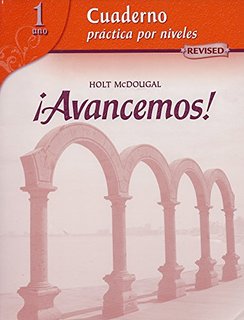
All Solutions
Page 275: Gramatica A
You can choose between the pronouns in the table below:
|Pronoun |Person and number |Ending in the preterite |
|–|–|–|
| Yo (I) |first-person singular |-é|
|Enrique (he) |third-person singular |-ó |
|Nosotros (we) |first-person plural |-amos |
**Hint:** Remember that **the verb matches the subject in person and number.** That is how you will know which pronoun to put.
– **Nosotros** pasamos…
(We spent the day at the beach.)
– **Enrique** llegó primero.
(Enrique arrived first.)
– **Yo** llegué…
(I arrived five minutes later.)
– **Yo** busqué …
(I searched for a place close to the sea.)
The verbs *lle**gar** (to arrive)* and *bus**car** (to search)* and other **-car** and **-gar** verbs are stem-changing verbs.
Verbs ending with **-car** – the *c* changes to *qu* before the *é*
Verbs ending with **-gar** – the *g* changes to *gu* before the *é*
– **Enrique** almorzó…
(Enrique had a pizza for lunch after swimming.)
– **Yo** saqué…
(I pulled out a sandwich from my backpack.)
– **Nosotros** jugamos…
(We played soccer on the beach.)
– **Enrique** tocó…
(Enrique played the guitar and sang.)
1. Nosotros
Enrique
2. Yo
Yo
3. Enrique
Yo
4. Nosotros
Enrique
In the table below, look at the endings for each pronoun as it will help you choose the correct verb form.
|Pronoun |Person and number |Ending in the preterite |
|–|–|–|
|Yo (I) |first-person singular |-é |
|Tú (you) |second- person singular|-aste |
|Mi mamá (she) |third-person singular |-ó |
**Hint:** Remember that **the verb matches the subject in person and number.** That is how you will know which verb form to put.
(I played the guitar on Saturday.)
Verbs like *to**car** (to play/to touch)* and other **-car** verbs are stem-changing verbs.
Verbs ending with **-car** – the *c* changes to *qu* before the *é*
(I arrived late to the soccer game.)
Verbs like *lle**gar** (to arrive)* and other **-gar** verbs are stem-changing verbs.
Verbs ending with **-gar** – the *g* changes to *gu* before the *é*
(You practiced basketball and your arms hurt.)
Although it may seem that *practi**car** (to practice)* ends with **-car**, the stem doesn’t change in this case.
(I searched for my little sister in her school.)
*Bus**car** (to search)* is yet another **-car** stem-changing verb.
Verbs ending with **-car** – the *c* changes to *qu* before the *é*
(My mom paid for the clothes that my brother bought.)
Although *pa**gar** (to pay)* ends with **-gar**, the stem doesn’t change in this case.
1. toqué
2. llegué
3. practicaste
4. busqué
5. pagó
**Hint:** Since the subject is you, you will write in the **first-person singular.**
– Ayer **practiqué** el tenis.
(Yesterday, I practiced tennis.)
The verb *practi**car** (to practice)* and other -**car** verbs are stem-changing verbs.
Verbs ending with **-car** – the *c* changes to *qu* before the *é*
– Hoy **llegué** a las ocho en la mañana a la escuela.
(Today, I arrived at 8 a.m. to school.)
The verb *lle**gar** (to arrive)* and other -**gar** verbs are stem-changing verbs.
Verbs ending with **-gar** – the *g* changes to *gu* before the *é*
– **Saqué** una buena nota en ciencias.
(I got a good grade in science.)
The verb *sa**car** (to get)* and other -**car** verbs are stem-changing verbs.
Verbs ending with **-car** – the *c* changes to *qu* before the *é*

